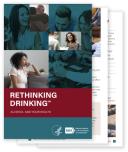For some people who drink, it takes quite a few drinks to “get a buzz” or feel relaxed, and they may be less likely to show signs of intoxication compared to others. This is sometimes called being able to “hold your liquor” or “drink someone under the table.” Often these individuals are unaware that their body’s lower response to the intoxicating effects of alcohol isn’t protection from alcohol problems but instead is a reason for caution.
These individuals tend to drink more, socialize with people who drink a lot, and develop a tolerance to alcohol (i.e., it takes more and more alcohol to feel or act intoxicated). As a result, they have an increased risk for developing alcohol use disorder (AUD). Someone who misuses alcohol, especially over the long-term, can experience permanent liver, heart, or brain damage. And all people who drink, regardless of the amount, need to be aware that critical decision-making abilities and driving-related skills are already diminished long before a person shows physical signs of intoxication.
A growing body of evidence indicates that women who drink are at increased susceptibility to short- and long-term alcohol-related consequences, including liver disease, cardiovascular disease, neurotoxicity, and alcohol-related memory blackouts, compared to men. One reason for this is that alcohol resides predominantly in body water, and pound for pound, women have less water in their bodies than men. This means that after a woman and a man of the same weight drink the same amount of alcohol, the woman’s BAC will tend to be higher, putting her at greater risk for harm.
Other biological differences may contribute as well. While alcohol misuse by anyone presents a serious public health concern, women face alcohol-related problems sooner and at lower drinking levels than men. Women who drink are also at greater risk for developing breast cancer than women who do not consume alcohol.
Some medicines that you might never have suspected can react with alcohol, including many that can be purchased "over the counter" without a prescription. Even some herbal remedies don't mix well with alcohol. The pamphlet Harmful Interactions: Mixing Alcohol with Medicines lists medications that can cause harm when taken with alcohol and describes the effects that can result. It does not include all possible medicines that may interact with alcohol, however. Protect yourself by avoiding alcohol if you are taking a medication and don't know its effect, or talk to your pharmacist or other health care professional.
There is no scientific evidence that anything will prevent liver damage from too much alcohol. Liver damage from alcohol misuse happens in stages. Some relatively mild damage may happen after a single binge drinking episode, but this reverses itself if the heavy alcohol use stops. If heavy drinking continues, however, liver damage can progress to several more advanced stages, including cirrhosis, and reversal of liver damage becomes much more difficult, if not impossible. In advanced stages, the only treatment is liver transplant. The best way to avoid damaging your liver is by not misusing alcohol, if you choose to drink. If you already have liver damage, stopping drinking could prevent progression to more serious liver disease. Even the standard recommended dose of acetaminophen can increase the risk of liver damage, particularly among people who drink heavily. For more information, see NIAAA’s information about alcohol’s effects on the body and this advisory on acetaminophen and liver injury.
The first step, of course, is to decide whether cutting down or quitting is best for you. See these considerations and discuss different options with a healthcare professional, a friend, or someone else you trust.
Thinking about cutting back? Here are some tips to try, small changes that can make a big difference. Choose two or three to try in the next week or two. It may help to have reminders to reinforce your decision to make a change, such as automated smartphone alerts that you send yourself.
Thinking about quitting? One size doesn’t fit all, and it’s important to find options that appeal to you. Start by visiting the support for quitting page.
Changing unhealthy behavior such as smoking, overeating, or drinking too much can take a lot of effort, and you may not succeed with the first try. Setbacks are common, but you learn more each time. Each try brings you closer to your goal. Whatever course you choose, give it a fair trial.
Anyone who is cutting back or quitting drinking is likely to be offered a drink at times when it’s unwanted. Rethinking Drinking has an activity or “mini-guide” to help you build resistance skills and stay in control. You’ll learn how to recognize the types of pressure to drink, avoid pressure, and cope with situations you can’t avoid.
As an example, here’s one tip: Have a polite, convincing "no, thanks" ready. The faster you can say no to drink offers, the less likely you are to give in. If you hesitate, it allows you time to think of excuses to go along. See the module for more insights and suggestions, including a worksheet where you can script your ‘no’ to practice for a situation in which the pressure persists.
If you worry about how others will react or view you if you make a change, challenge these thoughts by remembering that it's your life and your choice, and that your decision should be respected.
People commonly think of 12-step programs or 28-day inpatient rehabilitation as the only options for treating alcohol problems. Other choices are available, however. It’s a good idea to start by talking with a health care provider to put together an individualized treatment plan. For more information, see Professional Help.
Previous Calculators
Next Help Links



